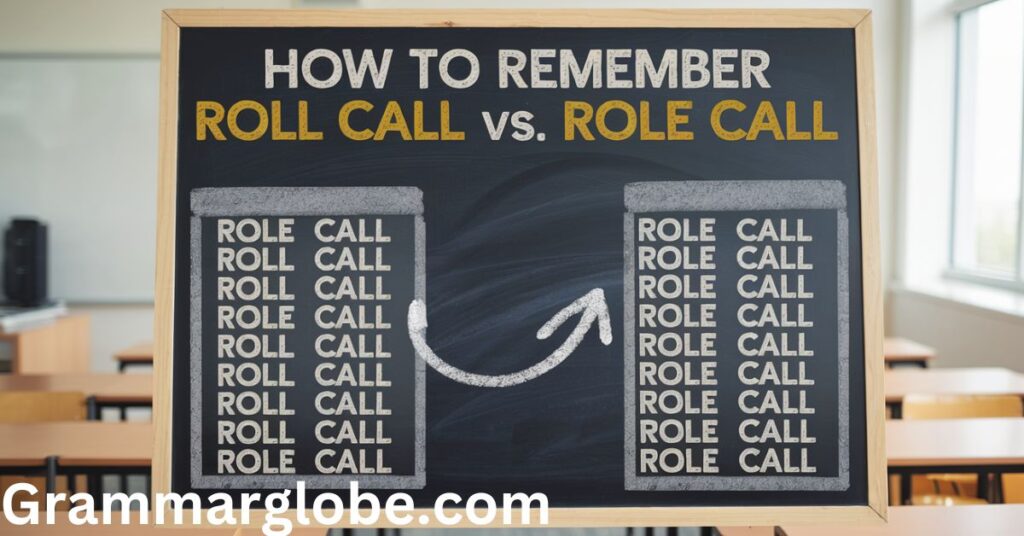If you’ve ever found yourself unsure about whether to use role call or roll call, you’re not alone. These terms are often confused, leading to misunderstandings about which one is correct. Despite sounding somewhat similar, these two phrases have different meanings and uses.
In this blog post, we will explore the correct usage of role call vs. roll call, and break down when each term should (or should not) be used. Whether you’re in a school, military setting, government institution, or professional meeting, understanding this distinction is crucial. Let’s dive in and get this straight once and for all.
What Is Roll Call?
Roll call is a practice that involves calling out names from a list to check attendance or verify participation. It is widely used in a variety of settings, from classrooms to military barracks to legislative sessions. At its core, roll call ensures that everyone who is supposed to be present or involved is accounted for.
The term “roll” refers to a list or register, typically a list of names. For instance, when a teacher starts a class, they will call the students’ names from a list to confirm who is in attendance. Similarly, in a military setting, soldiers may gather for a roll call to ensure that all personnel are present and accounted for.
Read Also : What Is the Collective Noun for Keys?What Is Role Call?
Now, let’s talk about role call, a term that is often mistakenly used in place of roll call. Technically, role call does not exist in the context of checking attendance or verifying presence. The word role refers to a person’s function, position, or duty within a group. So, role call would theoretically be a listing of a person’s role or position, rather than their physical presence.
For example, in a professional meeting, one might refer to a role call to discuss the different roles people are playing in a project or event. But this usage has nothing to do with attendance verification. The use of role call to mean “attendance check” is incorrect and widely considered a mistake.
Why Is “Role Call” Incorrect?
- Role: Refers to a person’s function or part in a particular context (e.g., a role in a play or role in a project).
- Roll: Refers to a list or registry of names, which is why roll call is used for attendance and verification.
Essentially, role call is a misstep that people often make because the two words sound the same. The role vs. roll confusion is not just limited to attendance scenarios but can also apply in other contexts, such as project role assignments or personnel tracking.
The Role Call Mistake

The confusion between role call and roll call has become increasingly common, especially in informal contexts. While roll call is the proper term, many people mistakenly use role call when discussing attendance or participation. This happens for a variety of reasons. First, the two words sound almost identical, which makes it easy to confuse them. Second, the concept of assigning a role to an individual might seem similar to the idea of verifying someone’s attendance. However, it’s crucial to distinguish between these two ideas.
The most common place where this mistake occurs is in educational settings. Teachers or administrators might say “Let’s do the role call,” when they actually mean “Let’s do the roll call.” This subtle error can confuse people, especially when the term is used outside its intended context.
Read Also : Other Ways To Say “Have a Great Weekend” (With Examples)The Difference Between Role Call and Roll Call
At this point, it’s clear that roll call and role call are two different terms with distinct meanings. Let’s break down the main differences:
- Roll Call: Refers to a process of verifying attendance by calling names from a list. This term is used in many contexts, such as schools, military settings, government settings, and professional meetings.
- Role Call: A misused term, often incorrectly used instead of roll call. It would imply a list of roles or positions, but this has nothing to do with checking physical attendance.
Roll Call Usage in Various Contexts
The term roll call is used across different sectors and settings. Let’s explore the different ways roll call is employed in these environments.
in Education
In schools and educational settings, roll call is a routine practice at the beginning of each class or day. Teachers call out the names of students from a list to make sure everyone is present. This ensures school attendance is recorded accurately, and allows for better tracking of student participation.
Digital attendance systems have become increasingly common in schools, replacing the traditional manual roll call. With these systems, students check in electronically, reducing the possibility of errors in attendance records. Some schools use apps or digital attendance systems that allow students to log in and confirm their attendance automatically.
Read Also : Coach’s or Coaches’ or Coaches? Understanding the Differencesin Military Settings
In military operations, roll call plays an important role in ensuring that all personnel are present and accounted for, especially in high-stakes situations. Military personnel tracking is crucial for operational efficiency and security. Missing personnel can lead to dire consequences, so roll calls are taken at various points throughout the day, often multiple times.
Soldiers are required to respond when their name is called during roll call. In the event that someone is missing, immediate actions are taken to locate them. This process helps maintain military discipline and is an essential part of everyday operations.
in Government Settings
Roll call votes are a significant part of government settings, especially in Congress and parliamentary systems. When a legislative body needs to make a decision, a roll call vote is often used to track how each representative votes on a bill or resolution. The names of each legislator are read out loud, and their vote (yes or no) is recorded.
Roll call votes ensure transparency in democratic processes by making the votes of elected officials public. This allows constituents to hold their representatives accountable for the decisions they make. In the United States Congress, for example, roll call votes are an integral part of the legislative process, where every member’s vote is made publicly available.

in Schools
As mentioned earlier, roll call in schools is primarily concerned with confirming attendance. Teachers or administrators call out student names, and students respond to confirm their presence. While the attendance verification process in schools has remained relatively unchanged for decades, newer technologies like digital attendance systems have streamlined the process, making it faster and more efficient.
In recent years, schools have adopted more advanced methods, including automatic attendance systems that use student ID cards or biometric scanners to check in students. This eliminates the need for manual attendance-taking and ensures more accurate records.
Read Also : Mastering English Spelling: “Comming” or “Coming”?How to Remember Roll Call vs. Role Call
To avoid the role call mistake, one helpful tip is to think of the word roll as representing a list. Just like a physical roll or a scroll, roll call involves calling off names from a list to verify attendance. On the other hand, role refers to a position or function, such as a role in a play or a role in a company, which has no connection to attendance or participation.
Here are a few simple tips to help you remember:
- Roll Call: Think of a roll of names being read aloud.
- Role Call: Think of the role or job a person holds in a team or organization.
By associating roll with list and role with function, you can more easily recall which term to use in various contexts.
Common Mistakes to Avoid
When using roll call or role call, there are a few common mistakes to avoid.
Mistake 1: Using “Role Call” for Attendance
This is perhaps the most common mistake. Many people use role call when they mean roll call, particularly in schools and informal settings. Always double-check your writing or speech to make sure you’re using roll call when discussing attendance.
Read Also : Excel or Accel: What is the Correct Spelling?Mistake 2: Confusing “Roll” with “Role” in Other Contexts
Another mistake is using role call when referring to someone’s position or
job. This can happen in discussions about team roles or job functions. For example, if you’re talking about a meeting where people are assigned different responsibilities, you might mistakenly say, “Let’s do a role call,” when you actually mean to discuss people’s roles.
Mistake 3: Misuse in Documents
In documents or official reports, using role call instead of roll call can lead to confusion, particularly if the document is intended for a professional or academic audience. It’s always best to use the correct term, especially in formal writing.
Read Also : The Odyssey Gareth Hinds Literary DevicesRoll Call Origin and Historical Context
The practice of roll call can be traced back to ancient times when parchment rolls were used to document attendance and participation. In medieval Europe, roll calls were essential for keeping track of knights, soldiers, and other individuals involved in military and governmental matters. Over time, this practice evolved, and today, roll call is an integral part of military operations, educational settings, and legislative bodies.
in Schools and Education
In schools, roll call serves as the first task of the day to confirm attendance. Teachers call each student’s name to verify that they are present in class. While this process has been largely unchanged over the years, digital attendance systems have become more common, streamlining the process and reducing the time needed to take attendance.
In some schools, students may be asked to mark their own attendance via an online portal or through mobile apps. This can help ensure accuracy and save time, especially when managing large groups of students.
Clarifying Roll Call in Government Settings
In government settings, particularly in Congress or other legislative bodies, roll calls serve as the foundation for maintaining transparency and ensuring accountability among elected officials. The practice has roots dating back to the formation of parliamentary systems. For example, in the United States Congress, every time a vote is held, it’s followed by a roll call vote, where the names of each member are called out, and their vote is recorded.
Roll call votes are used in both the U.S. House of Representatives and Senate. In these settings, members must respond “yea” or “nay” when their name is called, and this recorded vote becomes public knowledge, allowing the public to see where each member stands on a given issue. The transparency of roll call voting is vital for upholding the integrity of democratic processes, as it creates a public record of decisions made by elected officials.
Importance in Government:
- Accountability: Roll call votes ensure that lawmakers are held accountable for their decisions.
- Transparency: The public can access voting records and see how their elected representatives voted.
- Legitimacy: Ensures a fair and organized voting process, preventing errors and manipulation.
- Record Keeping: Provides a clear, permanent record of legislative actions that can be referenced in the future.
How to Remember Roll Call vs. Role Call
To recap the difference and avoid any confusion going forward, here are some quick mnemonics for words to help you differentiate between role call and roll call:
- Roll Call: Picture a list of names being read out loud. Think of a roll of paper or a scroll, where names are written down and checked off.
- Role Call: Remember that role refers to a person’s part or function in a group (e.g., “What’s your role in this project?”). This term is best used when referring to someone’s position or responsibilities, not attendance.

Remember:
- Roll Call = Attendance Check
- Role Call = Role/Position/Function in a group
By focusing on these differences, you’ll easily avoid the common mistake of using the wrong term in the wrong context.
Conclusion: Role Call or Roll Call?
In conclusion, while the terms role call and roll call may seem interchangeable at first glance, their meanings and applications are very different.
Roll call is the correct term to use when referring to the act of verifying attendance or participation, whether it’s in a school, military, or government setting. This term is used for recording presence, ensuring accountability, and maintaining discipline in various fields.
On the other hand, role call is a misused term that inaccurately substitutes for roll call. While role refers to someone’s function or position within a group, it should not be used in the context of checking attendance. Instead, remember that roll call is the established term for listing names and verifying presence.

Jenni Maic is a creative wordsmith at Grammar Globe, where she brings humor and wit to the world of puns and English grammar. With a passion for playful language and a knack for simplifying grammar, Jenni’s articles make learning engaging and entertaining. Discover her work at https://grammarglobe.com/.







